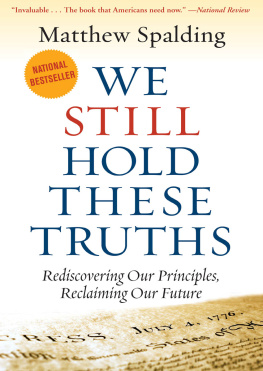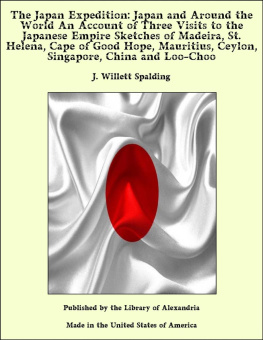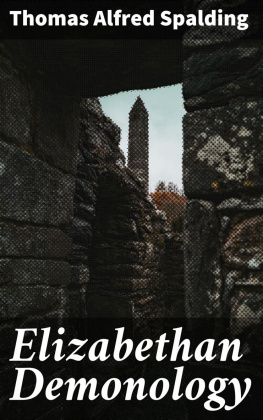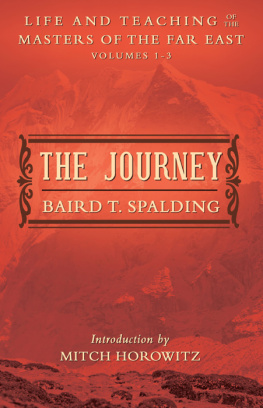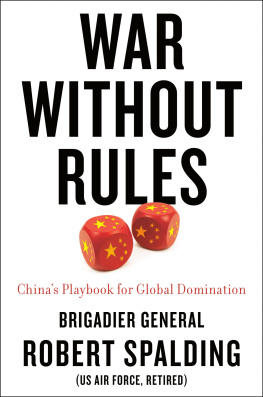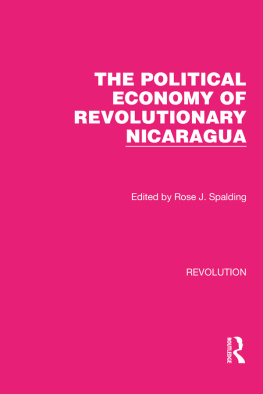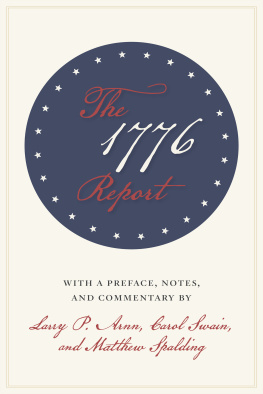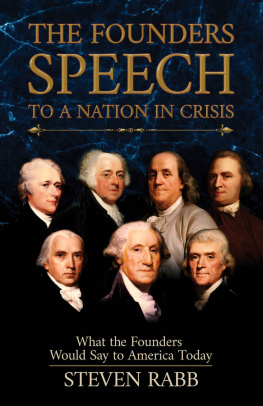Foreword

William J. Bennett
Our country seems to be in the midst of an identity crisis, divided, confused, and adrift. Change is the watchword of the moment, yet there is little consideration about where it is that we may be going. Everything is rapidly moving forward, despite a general sense among us that we are entering uncharted territory. Nevertheless, there are increasing calls for America to get back to its first principlesto reset its compass, so to speakas a way to give direction to our rudderless politics.
It has long been fashionable to believe that American culture has become too fragmented and pluralistic to justify our faith in a common creed, and few of our academic elites have shown an inclination to think seriously about what our age-old political principles mean for modern societydespite broad popular agreement about the importance of these principles and of making just such an effort.
When I was chairman of the National Endowment for the Humanities many years ago, I invited several hundred educational and cultural leaders to list ten books that every educated high school graduate should have read. Hundreds of texts received a few mentions, but the principal documents of American historythe Declaration of Independence, the Constitution, and The Federalistwere cited again and again by most respondents. This reflected a widespread belief that in reading these core documents, and other early American writings, students would learn something important not only about America, but also about politics simply, which would shed light on the great issues both then and now.
Is it possible that the guidance we are looking forthe framework for the change we seekand the most compelling vision for true American progress is to be found in the principles declared by a fledgling nation more than two hundred years ago?
At a time when there is no shortage of books that argue for specific policies or political agendas, We Still Hold These Truths is refreshingly radical, according to the original meaning of that word: It looks to the root of what we believe and seek to conservethe liberating principles, practical wisdom, and constitutional insights of the American Founding. It makes a clear and compelling case for Americas principles as an enduring source of real, practical guidance for today, explaining how we got so far off track, and laying out how to get our nation back on course.
Matthew Spalding argues that Americas principles form a consistent, meaningful, and universally true understanding of human liberty, and that an understanding of the permanent truths about manthe Laws of Nature and Natures Godsupplies us with standards and ends of political life. He reminds us that constitutional government derives its legitimacy from the consent of the governed and exists to secure the natural rights with which we are endowed by our Creator. He explains how the great principle of human equality is expressed in the constitutional rule of law and in the forms and institutions of limited constitutional government. The principles of liberty, he demonstrates, culminate in our understanding of self-governmentof the character and moral institutions that make for self-government, as well as the political institutions and free markets of a self-governing people. It is this model of national independence and human freedom that we uphold, and defend, at home and in the world.
Some argue that our founding principles mean nothing more than that each generation can decide for itself the meaning of equality and liberty, of the Declaration of Independence and the Constitution. And so they claim the mantle of the American Founders when they advocate new rights and more centralized government power. But the fact of the matter is that we got where we are today by rejecting the principles of our founding, not by following them. We Still Hold These Truths shows that modern liberalism proceeds upon a thorough-going critique of our founding, and that it attempts to define America in a different way, based on ideas found outside of America. The progressive thinkers of the early twentieth century, having rejected the very idea of self-evident truths and enduring principles, created a theory of a living, evolving Constitution, allowing government to expand and implement progress through more and more governmental control over everyday life. This philosophy of government defined and continues to shape contemporary American liberalism.
We now face a choice. One path is change for the sake of change, of continued travel along the road of declinefor this future, just witness the political and cultural implosion of modern Europe. The other is the path of renewal, based on what I have long called a great relearning, which seeks to rediscover Americas principles and restore them to their proper place in our political life, as the cornerstone of Americas public philosophy.
We Still Hold These Truths shows that the way forward is to transcend the partisan ideologies and the special interests that divide us, and instead re-create the deep and abiding national consensus that defines us by appealing to the principles that unite all Americans in our common purpose.
In his last Annual Message to Congress, one month before he issued the Emancipation Proclamation, Abraham Lincoln spoke of how we shall nobly save, or meanly lose, the last best hope of earth. I firmly believe that we are still that hope, and that it is still in our power and still our responsibility to uphold and advance the truths of human freedom. The source of that belief, and that hope, is Americas eternal capacity for rededicating itself to these truths that we hold, applicable to all men and all times.
Former Secretary of Education William J. Bennett is the Washington Fellow of the Claremont Institute and the author of America: The Last Best Hope, a multivolume history of America.
Introduction

Curiosities in Glass Cases
Not far from the United States Capitol, just down Pennsylvania Avenue in Washington, D.C., is the magnificent building of the National Archives of the United States. Designed by the great American architect John Russell Pope, its faade, columns, massive bronze doors, and central rotunda are intended to evoke classical Greek themes as well as the neoclassical style of the Roman Pantheon.
The temples of the ancient world were grand monuments constructed to provide sacrifices to the pagan gods, and the Pantheon was to be the grandestthe temple of all the gods, where the victorious Romans kept their conquered deities and worshipped their Caesars. The difference between these two structuresthe Pantheon and the National Archivescould not be more striking, or more significant.

